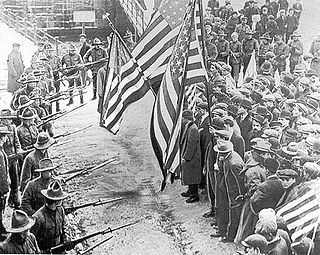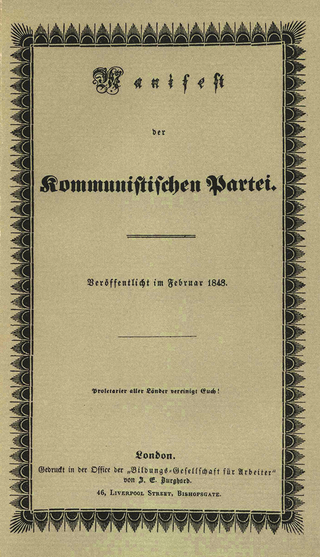
Left-wing politics describes the range of political ideologies that support and seek to achieve social equality and egalitarianism, often in opposition to social hierarchy as a whole or certain social hierarchies. Left-wing politics typically involve a concern for those in society whom its adherents perceive as disadvantaged relative to others as well as a belief that there are unjustified inequalities that need to be reduced or abolished through radical means that change the nature of the society they are implemented in. According to emeritus professor of economics Barry Clark, supporters of left-wing politics "claim that human development flourishes when individuals engage in cooperative, mutually respectful relations that can thrive only when excessive differences in status, power, and wealth are eliminated."

The Communist Manifesto, originally the Manifesto of the Communist Party, is a political pamphlet written by Karl Marx and Friedrich Engels, commissioned by the Communist League and originally published in London in 1848. The text is the first and most systematic attempt by Marx and Engels to codify for wide consumption the historical materialist idea that "the history of all hitherto existing society is the history of class struggles", in which social classes are defined by the relationship of people to the means of production. Published amid the Revolutions of 1848 in Europe, the Manifesto remains one of the world's most influential political documents.
The Christian left is a range of Christian political and social movements that largely embrace social justice principles and uphold a social doctrine or social gospel based on their interpretation of the teachings of Christianity. Given the inherent diversity in international political thought, the term Christian left can have different meanings and applications in different countries. While there is much overlap, the Christian left is distinct from liberal Christianity, meaning not all Christian leftists are liberal Christians and vice versa.
The Revolutionary Socialist League (RSL) was a Trotskyist group in the United States established in 1973 and disbanded in 1989.
Marxism is a political philosophy and method of socioeconomic analysis. It uses a materialist interpretation of historical development, better known as "historical materialism", to understand class relations and social conflict. It also uses a dialectical perspective to view social transformation. Marxism originates from the works of 19th-century German philosophers Karl Marx and Friedrich Engels. Marxism has developed over time into various branches and schools of thought, As a result, there is no single, definitive Marxist theory. Marxism has had a profound effect in shaping the modern world, with various left-wing and far-left political movements taking inspiration from it in varying local contexts.
The connection between left-leaning ideologies and LGBT rights struggles has a long and mixed history. The status of LGBT people in socialist states have varied throughout history.
In Marxist theory, a new democratic society will arise through the organised actions of an international working class, enfranchising the entire population and freeing up humans to act without being bound by the labour market. There would be little, if any, need for a state, the goal of which was to enforce the alienation of labor; as such, the state would eventually wither away as its conditions of existence disappear. Karl Marx and Friedrich Engels stated in The Communist Manifesto and later works that "the first step in the revolution by the working class, is to raise the proletariat to the position of ruling class, to win the battle for democracy" and universal suffrage, being "one of the first and most important tasks of the militant proletariat". As Marx wrote in his Critique of the Gotha Program, "between capitalist and communist society there lies the period of the revolutionary transformation of the one into the other. Corresponding to this is also a political transition period in which the state can be nothing but the revolutionary dictatorship of the proletariat". He allowed for the possibility of peaceful transition in some countries with strong democratic institutional structures, but suggested that in other countries in which workers can not "attain their goal by peaceful means" the "lever of our revolution must be force", stating that the working people had the right to revolt if they were denied political expression. In response to the question "What will be the course of this revolution?" in Principles of Communism, Friedrich Engels wrote:
Above all, it will establish a democratic constitution, and through this, the direct or indirect dominance of the proletariat.
Communism is a left-wing to far-left sociopolitical, philosophical, and economic ideology within the socialist movement, whose goal is the creation of a communist society, a socioeconomic order centered around common ownership of the means of production, distribution, and exchange that allocates products to everyone in the society based on need. A communist society would entail the absence of private property and social classes, and ultimately money and the state.
Left-wing nationalism or leftist nationalism is a form of nationalism which is based upon national self-determination, popular sovereignty, and left-wing political positions such as social equality. Left-wing nationalism can also include anti-imperialism and national liberation movements. Left-wing nationalism often stands in contrast to right-wing politics and right-wing nationalism.
Far-left politics, also known as the extreme left, are politics further to the left on the left–right political spectrum than the standard political left. The term does not have a single, coherent definition; some scholars consider it to be the left of communist parties, while others broaden it to include the left of social democracy. In certain instances—especially in the news media—far left has been associated with some forms of authoritarianism, anarchism, communism, and Marxism, or are characterized as groups that advocate for revolutionary socialism and related communist ideologies, or anti-capitalism and anti-globalization. Far-left terrorism consists of extremist, militant, or insurgent groups that attempt to realize their ideals through political violence rather than using democratic processes.
Communist attitudes towards LGBT rights have evolved radically in the 21st century. In the 19th and 20th century, communist parties and Marxist–Leninist states varied on LGBT rights; some Western parties were among the first political parties to support LGBT rights, while others, especially the Soviet Union and its Eastern Bloc, harshly persecuted people of the LGBT community.

The Militant faction was an organized grouping of Marxists in the Socialist Party of America (SPA) who sought to steer that organization from its orientation towards electoral politics and towards direct action and revolutionary socialism. The faction emerged during 1930 and 1931 and achieved practical control of the organization in 1934. The existence of the "Militants" and the threat they represented to the political line of the SPA caused traditional electorally oriented members to form an organized grouping of their own, known as the "Old Guard faction." In 1935 the personal and political friction between these two basic tendencies lead to an organizational split, with the Old Guard faction leaving to establish the Social Democratic Federation (SDF). The Militant faction itself shattered in the aftermath of the 1935 party split with only a small core loyal to perennial Presidential candidate Norman Thomas remaining in the organization by the coming of World War II.
Marxism is a method of socioeconomic analysis that originates in the works of 19th century German philosophers Karl Marx and Friedrich Engels. Marxism analyzes and critiques the development of class society and especially of capitalism as well as the role of class struggles in systemic, economic, social and political change. It frames capitalism through a paradigm of exploitation and analyzes class relations and social conflict using a materialist interpretation of historical development – materialist in the sense that the politics and ideas of an epoch are determined by the way in which material production is carried on.
Revolutionary socialism is a political philosophy, doctrine, and tradition within socialism that stresses the idea that a social revolution is necessary to bring about structural changes in society. More specifically, it is the view that revolution is a necessary precondition for transitioning from a capitalist to a socialist mode of production. Revolution is not necessarily defined as a violent insurrection; it is defined as a seizure of political power by mass movements of the working class so that the state is directly controlled or abolished by the working class as opposed to the capitalist class and its interests.
In Marxist philosophy, the dictatorship of the proletariat is a condition in which the proletariat, or working class, holds control over state power. The dictatorship of the proletariat is the transitional phase from a capitalist and a communist economy, whereby the post-revolutionary state seizes the means of production, mandates the implementation of direct elections on behalf of and within the confines of the ruling proletarian state party, and institutes elected delegates into representative workers' councils that nationalise ownership of the means of production from private to collective ownership. During this phase, the administrative organizational structure of the party is to be largely determined by the need for it to govern firmly and wield state power to prevent counterrevolution, and to facilitate the transition to a lasting communist society.
A socialist state, socialist republic, or socialist country, sometimes referred to as a workers' state or workers' republic, is a sovereign state constitutionally dedicated to the establishment of socialism. The term communist state is often used synonymously in the West, specifically when referring to one-party socialist states governed by Marxist–Leninist communist parties, despite these countries being officially socialist states in the process of building socialism and progressing toward a communist society. These countries never describe themselves as communist nor as having implemented a communist society. Additionally, a number of countries that are multi-party capitalist states make references to socialism in their constitutions, in most cases alluding to the building of a socialist society, naming socialism, claiming to be a socialist state, or including the term people's republic or socialist republic in their country's full name, although this does not necessarily reflect the structure and development paths of these countries' political and economic systems. Currently, these countries include Algeria, Bangladesh, Guyana, India, Nepal, Nicaragua, Sri Lanka and Tanzania.

The Marx–Engels–Lenin Institute, established in Moscow in 1919 as the Marx–Engels Institute, was a Soviet library and archive attached to the Communist Academy. The institute was later attached to the governing Central Committee of the Communist Party of the Soviet Union and served as a research center and publishing house for officially published works of Marxist thought. From 1956 to 1991, the institute was named the Institute of Marxism–Leninism (IML).
The history of socialism has its origins in the Age of Enlightenment and the 1789 French Revolution along with the changes that it brought, although it has precedents in earlier movements and ideas. The Communist Manifesto was written by Karl Marx and Friedrich Engels in 1847-48 just before the Revolutions of 1848 swept Europe, expressing what they termed scientific socialism. In the last third of the 19th century parties dedicated to Democratic socialism arose in Europe, drawing mainly from Marxism. The Australian Labor Party was the world's first elected socialist party when it formed government in the Colony of Queensland for a week in 1899.

Lotta Comunista or Gruppi Leninisti della Sinistra Comunista is a political party born in Italy that does not recognize parliamentary dynamics for the party's strategy in the current historical period, and thus describes itself as extra-parliamentary. It is a revolutionary and internationalist party founded by Arrigo Cervetto and Lorenzo Parodi in 1965 and inspired by the theory and practice of Marx, Engels, and Lenin.

The following outline is provided as an overview of and topical guide to Marxism:






